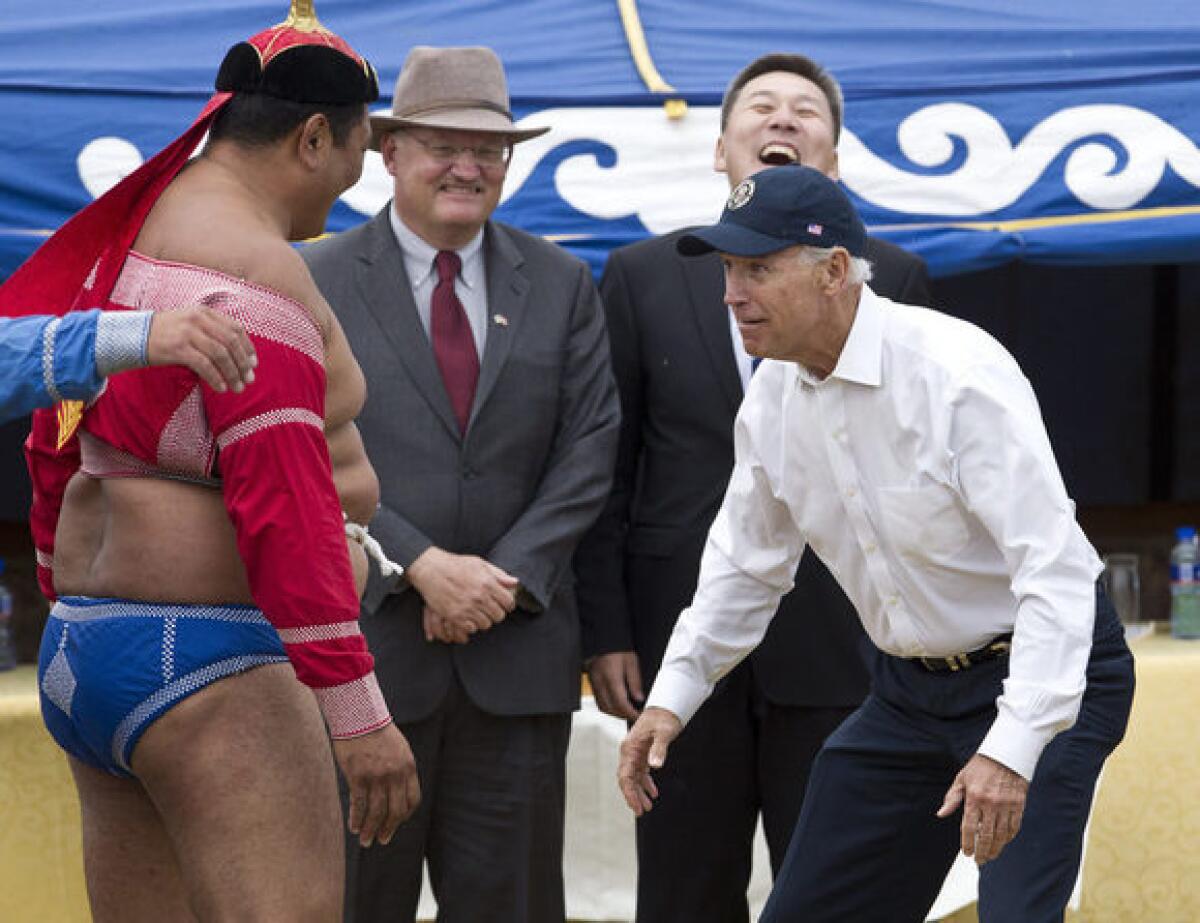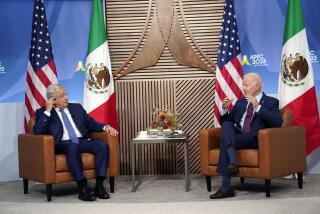After three years, VP role suits Biden

He squared up against a 250-pound, barely-clothed Mongol wrestler, accepted as a gift a handsome brown horse that he named Celtic, and marveled at the logic-defying contortions of a physical performer balancing herself by her teeth.
Mongolia, the middle stop of Vice President Joe Biden’s just-concluded three-nation tour of Asia, was also the lightest. It was the first visit to the country by a sitting U.S. vice president since 1944, when Franklin Roosevelt dispatched Henry Wallace as far as he could from Washington -- just before Wallace was unceremoniously dumped from the Democratic ticket in favor of Harry Truman.
That’s not happening to this vice president.
“I’ve been unable to figure out how to get off [the ticket],” Biden said in an interview last week aboard Air Force Two after leaving Mongolia.
Biden had been asked to finally settle the subject of many cocktail-party conversations inside the beltway, particularly the question of whether he and Secretary of State Hillary Clinton might trade jobs after 2012.
Three years to the day that he accepted Barack Obama’s offer to be his running mate in the 2008 campaign, Biden said his role as vice president has been precisely what he and his then-Senate colleague discussed.
“There really is a close working relationship and a great deal of trust. And that’s what I signed up for,” Biden said.
His journey over nine days this month is an example of that trust. The primary purpose was to build on Washington’s relationship with China, a top priority for President Obama since taking office.
Over four days and multiple one-on-one meetings, Biden began sizing up the man widely expected to become China’s next president, but about whom little is known – Vice President Xi Jingping.
Biden said he went to China without specific marching orders from Obama.
“There’s a confidence level about my ability to do the job,” Biden said. “As I head off to China, it’s a very serious relationship. There’s no, ‘Let me tell you what I need you to do or say.’”
Originally planned as a get-to-know-you trip, it had to be postponed once because of the debt-ceiling crisis in Washington -- something Biden also found himself playing a key part in.
Publicly, Biden’s mission to Asia became one of reassurance, telling one Chinese leader after another that the country’s investment in U.S. treasuries was secure.
Chinese Premier Wen Jiabao, in a meeting at the ornate Purple Light Pavilion, thanked Biden for bringing that message to the Chinese people. Biden responded by again stating that the Chinese “have nothing to worry about” with regard to America’s financial well-being.
In Japan, where Biden toured the damage wrought by the March earthquake and tsunami, he linked Japan’s struggles to the American budget challenge, saying both nations would confound those who say they cannot rebound.
Biden would later dispute that it was ever a major concern.
“I didn’t come to explain a damn thing,” he bluntly declared in a speech to U.S. troops at Yokota Air Base in Japan on Wednesday.
In an interview, Biden said he sensed little anxiety from the Chinese leaders behind closed doors. Like Americans, he said, they were only hoping that the U.S. economy would begin growing again “because it’s in their interest.”
“I think [Xi] and the leadership on down is confident in our stability, confident in our ability to deal with our problems,” he said.
Biden also came to pressure the Chinese to do more to level the playing field for U.S. businesses seeking to do business with China. U.S. businesses secured deals worth $500 million in increased exports and future development during Biden’s trip, but the vice president prodded the country’s leadership to continue moving forward with a plan to rebalance its economy to one that is less dependent on exports and sustained by increased domestic consumption.
Building the kind of relationship Biden worked toward is critical to get results, an analyst said.
“You can’t get someone to act against his country’s national interest,” said Jeff Bader, a former China policy specialist for the Obama administration, now with the Brookings Institution. “The objective is to get a degree of understanding about [their] political situation and to try to appeal for cooperation within the limits of what they can do in their system. And if you have a personal relationship, you’re more likely to get that kind of response.”
Based on their conversations in the past weeks, Biden said Xi is someone he thinks he can work with.
“He said he wanted to build a personal friendship,” Biden said. “And he understands that this relationship is worth deepening.”
Now back in the United States, the vice president will move on to the many other assignments on his desk -- the next round of deficit talks, finalizing the administration’s new jobs plan, and the reelection effort, to name a few.
The American people are more sophisticated about the global economy, and understand the administration inherited a “God-awful” mess, Biden said when asked how he and Obama can win a second term even with stubbornly high unemployment.
The debt-ceiling debate in particular has “crowded out the things that people want to talk about,” like the administration’s jobs plan, something Obama will roll out in the coming weeks.
More guarded than he has been in the past, Biden refused to share specifics about what the new plan might include.
“I’ve learned as vice president, it’s a good thing not to scoop the president’s position on anything,” he said. “It took me a while to learn it, but I learned it.”
More to Read
Start your day right
Sign up for Essential California for news, features and recommendations from the L.A. Times and beyond in your inbox six days a week.
You may occasionally receive promotional content from the Los Angeles Times.






